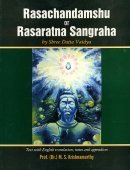Krimiroga, Kṛmiroga, Krimi-roga: 6 definitions
Introduction:
Krimiroga means something in Hinduism, Sanskrit. If you want to know the exact meaning, history, etymology or English translation of this term then check out the descriptions on this page. Add your comment or reference to a book if you want to contribute to this summary article.
The Sanskrit term Kṛmiroga can be transliterated into English as Krmiroga or Krimiroga, using the IAST transliteration scheme (?).
In Hinduism
Ayurveda (science of life)
Rasashastra (Alchemy and Herbo-Mineral preparations)
Source: Wisdom Library: Rasa-śāstraKrimiroga (क्रिमिरोग) or simply Krimi refers to “worms and bacilli” according to the fifth volume of the Rasajalanidhi (chapter 12). Accordingly, “those people are generally the victims of worms (krimi) who take their meals before the previous meals are properly digested, eat too much of sweets, sours, puddings, and molasses, avoid physical exercise, sleep in day time, and eat articles of foodstuff, incongenial by combination.—Worms (krimi) are of two different kinds, viz. internal and external. They are also subdivided into four different kinds, according to the place of their origin, viz., external dirt, phlegm, blood, and stool. They are altogether of twenty different kinds”.
Unclassified Ayurveda definitions
Source: gurumukhi.ru: Ayurveda glossary of termsKṛmiroga (कृमिरोग):—Worm infestation

Āyurveda (आयुर्वेद, ayurveda) is a branch of Indian science dealing with medicine, herbalism, taxology, anatomy, surgery, alchemy and related topics. Traditional practice of Āyurveda in ancient India dates back to at least the first millenium BC. Literature is commonly written in Sanskrit using various poetic metres.
Languages of India and abroad
Sanskrit dictionary
Source: Cologne Digital Sanskrit Dictionaries: Monier-Williams Sanskrit-English DictionaryKṛmiroga (कृमिरोग):—[=kṛmi-roga] [from kṛmi] m. disease caused by worms, [Suśruta]
[Sanskrit to German]
Sanskrit, also spelled संस्कृतम् (saṃskṛtam), is an ancient language of India commonly seen as the grandmother of the Indo-European language family (even English!). Closely allied with Prakrit and Pali, Sanskrit is more exhaustive in both grammar and terms and has the most extensive collection of literature in the world, greatly surpassing its sister-languages Greek and Latin.
Kannada-English dictionary
Source: Alar: Kannada-English corpusKṛmirōga (ಕೃಮಿರೋಗ):—[noun] a disease caused by any of the parasitic worms.
--- OR ---
Krimirōga (ಕ್ರಿಮಿರೋಗ):—[noun] any disease or disorder caused by the presence of parasitic worms in the intestines, etc.; worms.
Kannada is a Dravidian language (as opposed to the Indo-European language family) mainly spoken in the southwestern region of India.
See also (Relevant definitions)
Partial matches: Krimi, Roga, Roka.
Starts with: Krimirogari.
Full-text: Uttaratantra, Rasanjana, Vanga, Krimi, Gandhaka.
Relevant text
Search found 3 books and stories containing Krimiroga, Kṛmiroga, Krimi-roga, Kṛmi-roga, Krmiroga, Krmi-roga, Kṛmirōga, Kṛmi-rōga, Krimirōga, Krimi-rōga; (plurals include: Krimirogas, Kṛmirogas, rogas, Krmirogas, Kṛmirōgas, rōgas, Krimirōgas). You can also click to the full overview containing English textual excerpts. Below are direct links for the most relevant articles:
Sushruta Samhita, Volume 6: Uttara-tantra (by Kaviraj Kunja Lal Bhishagratna)
Chapter LIV - Symptoms and Treatment of Worms (Krimi-roga) < [Canto III - Kaya-chikitsa-tantra (internal medicine)]
History of Indian Medicine (and Ayurveda) (by Shree Gulabkunverba Ayurvedic Society)
Chapter 12 - Nosology and the Triumvirate < [Part 6 - The Science of the Triumvirate (Tridosha) Pathogenesis]
Charaka Samhita and Sushruta Samhita (by Nayana Sharma)
Ritualism in the Medical Texts < [Chapter 8]
Related products


